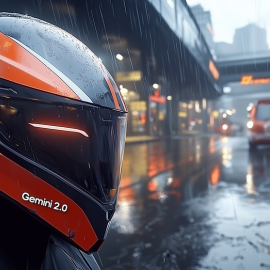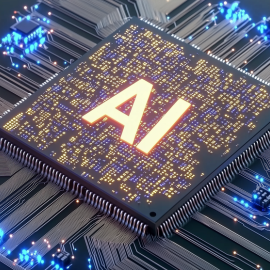The Neural Link | Edition 3
Welcome to the latest edition of The Neural Link! As we step into 2025, here’s a look back at the most exciting AI developments from December—insights and innovations shaping the future of technology:
🌟 OpenAI's 12 Days of Christmas: Exciting announcements, new models, and enhanced tools.
🤖 Google’s Gemini 2.0: A game-changer in multimodal AI with pioneering features.
🧠 Ilya Sutskever’s Vision for AI: Key insights on the next evolution of AI systems.
🎥 Instagram’s Movie Gen: Revolutionising video editing with text-based AI prompts.
⚡ Amazon’s Nova Models: Powerful AI tools designed to compete with industry leaders.
Let’s dive in!
🌟 Top Story: OpenAI's 12 Days of Christmas Announcements
OpenAI revealed significant updates during its 12 Days of Christmas campaign, showcasing innovations that enhance productivity and creativity:
- o1 Model Release: Advanced reasoning for complex problem-solving.
- ChatGPT Pro: Premium features for high-demand users.
- Reinforcement Fine-Tuning Program: Enhanced training via user interaction.
- Sora: A text-to-video model generating realistic visuals.
- ChatGPT Canvas Updates: Improved tools for digital content editing.
- ChatGPT in Apple Intelligence: Integration with Apple devices for seamless functionality.
- Advanced Voice with Santa Mode: Fun seasonal features.
- Projects in ChatGPT: Tools for better task organisation and workflow.
- ChatGPT Search Enhancements: Refined information retrieval.
- 1-800-CHATGPT: AI accessibility via telephone.
- ChatGPT App Updates: Expanded functionality and voice integration.
- o3 and o3-mini Models: Cost-effective, high-performing AI tools.
Our take:
- Our tests with o1 indicate a major accuracy improvement in solving long, complex client issues.
- Projects in ChatGPT are a great addition if you find yourself referring to previous conversations regularly.
🤖 Google’s Gemini 2.0: Redefining AI 
Google’s Gemini 2.0 leads the LM Arena, boasting multimodal capabilities and tools for universal AI assistance. Notable projects include Astra for automation and Mariner for browser-based AI tasks.
🧠 Ilya Sutskever on AI’s Next Phase
At NeurIPS 2024, Sutskever forecasted the end of pre-training on internet data, emphasising synthetic data, reasoning, and agency. His insights suggest a shift toward self-aware systems with advanced reasoning abilities.
🎥 Instagram’s Movie Gen
Instagram’s Movie Gen allows users to edit videos through simple text prompts, enabling quick and creative customisation. It’s set to transform content creation for casual users and professionals alike.
⚡ Amazon’s Nova Models and Trainium Chips 
At AWS RE:Invent 2024, Amazon unveiled "Project Rainier," leveraging Trainium 2 chips to power advanced AI models like Nova. Key features include:
- Nova Micro: Fast, low-cost text analysis with 128k token windows.
- Nova Lite/Pro: Multimodal tools for text, image, and video tasks.
- Nova Canvas/Reel: Specialised for image generation and video creation.
Amazon also introduced tools to mitigate AI hallucinations, reinforcing model reliability.
Other News in AI
🍏 Apple Intelligence and ChatGPT
Apple’s iOS 18.2 brings AI features like Image Playground and Genmoji to iPhones, iPads, and Macs. Integration with ChatGPT enables voice commands, document analysis, and live object recognition.
🌐 World Labs: Immersive 3D AI Worlds
World Labs launched a system that turns static images into 3D environments, complete with cinematic controls and consistent physics. This tool has applications in short films and augmented reality.
💻 NVIDIA’s $250 AI Supercomputer
NVIDIA introduced the Jetson Orin Nano Super, a compact supercomputer for local AI models. It’s ideal for robotics, visual AI, and industrial applications.
📜 Australian Government AI Policy Updates 
The DTA released an updated AI Use Policy and Supplier Code of Conduct focusing on transparency, privacy, and ethical use of AI:
- Mandatory compliance with privacy standards.
- Guidelines for human oversight in AI decision-making.
- Risk assessments for AI applications.
These updates aim to ensure safe and responsible AI practices and are relevant to you if you provide services to the federal government.
Case Study
Learn how Flinders University is leveraging our training to ensure the ongoing success of their Microsoft 365 Copilot roll-out. By equipping staff with practical skills in generative AI and prompt engineering, they’re boosting productivity and efficiency across PowerPoint, Word, and Outlook.
Read the full case study to explore how our tailored training is driving their success.
2025 Predictions
Generative AI has evolved at lightning speed since ChatGPT debuted two years ago. I recently came across the term "AI vertigo," describing the overwhelming feeling of trying to keep up with all the AI news. Hopefully, this newsletter helps ease that for you.
vertigo," describing the overwhelming feeling of trying to keep up with all the AI news. Hopefully, this newsletter helps ease that for you.
My two AI predictions for the year ahead:
- AI Agents mainstream adoption, demonstrated by Anthropic’s computer control model (see our November edition for more), Google’s Project Mariner in Gemini, and OpenAI’s hinted-at project codenamed Operator.
-
-
- Roles focused on routine, process-based tasks will face an impact.
-
-
-
- Agents will (hopefully positively) affect your online consumer experiences. For example, to book your holiday, pay your bills, and do your online shopping for you, you just need to prompt with your objectives.
-
- AI Voice technology will gain traction in customer service and sales. As AI costs drop, disruption in these areas is likely in 2025 (60% price drop recently announced by OpenAI). You may soon encounter an AI voice on a customer service call or a potential scam attempt.
Lastly, our webinar from last year offers guidance on launching or scaling generative AI in 2025.
That’s it for this edition. Please share your thoughts or ideas for future topics—we’d love to hear from you. Feel free to forward this newsletter to anyone who might find it useful and please get in touch if you’d like our help getting AI up and running in your organisation.
Until next time.
Matt Dunn
Head of Automation and AI
Want more? Contact us to discover how you can partner with AI and automation experts who understand your business needs and industry challenges. You can also subscribe to The Neural Link, our monthly newsletter filled with the latest trends and insights in AI and automation.
Author
AI is changing the way businesses operate, and as Head of AI & Automation at The Missing Link, I help organisations harness its full potential. With a background in commercial consulting and intelligent automation, I’ve guided companies in streamlining operations, reducing inefficiencies, and embracing AI-driven innovation. Before joining The Missing Link, I led an automation start-up to profitability and have since trained over 2,000 professionals in generative AI, including Microsoft Copilot and ChatGPT. I’ve also authored books on prompt engineering. When I’m not exploring AI’s capabilities, you’ll find me enjoying yoga, golf, or making my daughters laugh.


